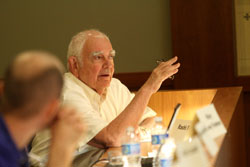In Memoriam
 Rashi Fein, PhD, Professor of the Economics of Medicine, Emeritus, at the Harvard Medical School, passed away on September 8th at the age of 88.
Rashi Fein, PhD, Professor of the Economics of Medicine, Emeritus, at the Harvard Medical School, passed away on September 8th at the age of 88.
He was known as a gifted storyteller, a consummate gentleman, and a warm, compassionate human being. He was also a cherished friend and colleague who generously gave advice to young Scholars at annual meetings in years past.
He had a long history with RWJF (dating back to David Rogers, the first Foundation president in the 1970s and 1980s). He served as a trusted consultant to the Foundation, as an evaluator of the RWJF Clinical Scholars program (1990), and as the former National Advisory Committee chair for the RWJF Scholars in Health Policy Research program for eight years (1994 – 2002).
Over the past year, he had been working with a group of scholars on a co-edited,coauthored volume sponsored by the RWJF Investigator Awards in Health Policy Research program in collaboration with Princeton University. The volume, which will be published by Oxford University Press in June 2015, is titled Medicare and Medicaid at Fifty. His contribution is a chapter on his reflections as the chair of the Medical Assistance Advisory Council, appointed by Wilbur Cohen (the Acting Secretary of Health, Education, and Welfare) in the years immediately following enactment of Medicare and Medicaid in 1965. In the chapter, he tells a compelling story of how the perceptions of the two programs by lawmakers, administrators and others differed greatly – Medicare was perceived as a “social insurance” entitlement program for the elderly while Medicaid was a “poor person’s” program aligned with welfare for pregnant women and their dependent children. These differing perceptions played out in rather predictable ways when it came to resource allocation and political influence. His recollections of those early days are both striking and informative as the nation moves forward with implementing the Affordable Care Act.
His chapter in Medicare and Medicaid at Fifty may prove to be his final published work. If so, it would be a fitting denouement to a stellar academic career, and the authors are grateful to have had his wisdom grace the volume. The volume is being dedicated to his memory.
This sad occasion brings to mind W.H. Auden’s elegy for W.B. Yeats: “The current of his feeling failed; he became his admirers.”


